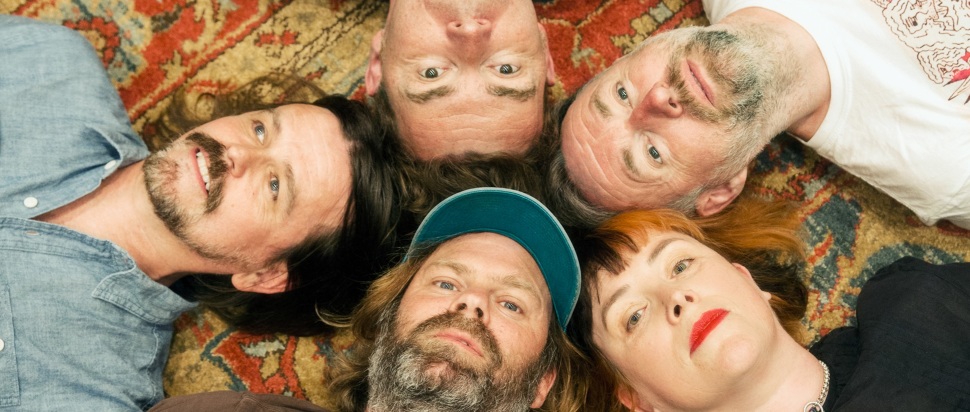Slowdive's Simon Scott on their return to touring
Ahead of shows in Glasgow and Edinburgh as part of a tour celebrating their fifth studio album, Everything Is Alive, we catch up with Slowdive drummer Simon Scott
In January, Slowdive’s Rachel Goswell posted throwback photos from the band’s first rehearsal upon deciding to reform. The fresh-faced teenagers on the cover of their sound-defining record Souvlaki had grown a little wrinkled. It was their first practice in 20 years. It’s been another ten since they met up in their hometown of Reading, a few more wrinkles on those faces. But in a reunion that has lasted almost doubly as long as their initial stint, few could have predicted Slowdive’s longevity, the way the zeitgeist has come to meet them head on, or the drive with which they’ve approached new and vital work.
“It’s quite well documented now that we were on the periphery of any kind of success back in the 90s,” says the band’s drummer Simon Scott, calling in hours ahead of departure for a run of Slowdive shows throughout Europe and the UK. At most of them, there’s not a ticket left to be had. “We were happy with being a small, underground band back then. But to get to the level where we're selling more records and playing bigger venues – we’re very humbled. We're still the same people and we still play similar sorts of music, but since we reformed it kind of doesn't feel like too big a leap up. We feel like we're ready to do bigger venues.”
That modest sentiment seems like something befitting of a young band on the rise, not one that has set the tone for an entire genre. But it’s easy to forget now – after the positively received reunion, the critically-acclaimed new material, and slow turnaround thanks to the passing of time and the flowering memory of their importance – that shoegaze and dream pop, especially when played by Slowdive, were derided and misunderstood in their first iteration. Panned in the press, and playing to empty rooms, by the time its members had called it quits, Slowdive didn’t get the cherry-on-the-cake live shows they’re used to now.
This month, Slowdive bring their ascendant noise to Glasgow’s Barrowlands. Feted by fans and performers alike, it’s a venue in Scotland that reflects a kind of tidemark for where a group sits in the pantheon of great bands currently doing it. If you can blow the roof off the Barras, you’re doing something right – and if you’ve seen Slowdive play live, you know they will. Scott calls it “a privilege and an honour” to finally be playing there.
Slowdive – alongside the likes of Duster and Life Without Buildings – are one of a few esoteric legacy acts really penetrating the cultural climate. That is in no small part down to how their music – for better or worse – has travelled across social media. If the dynamic at Slowdive shows had changed by the time they were touring their self-titled record post-reunion, the difference is even more stark at these shows in support of their latest album Everything Is Alive. Now countless videos on TikTok document the recontextualisation of their art by people who weren’t even born when the band first dissolved.
“Down the front of shows, there's a very young audience that have just discovered Slowdive – it’s maybe their first ever gig. And we've just been to America where there’s kids in Slowdive T-shirts with their parents who’ve been fans since the 90s,” says Scott, almost flabbergasted. “Those old songs seem to resonate. We wrote them as teenagers, with teenage feelings, and [young people now] are latching on to that angst and yearning. I think we've always made really personal music and those reflective moments you have as a teenager sitting in your room, they’ve floated through to a new generation.”
Slowdive’s influence is, at this point, pervasive: a precursor for many of the bands populating the modern shoegaze canon, as well as for wildly popular acts using the same building blocks – shimmering guitars, androgynous vocals – but lacking a similarly robust circulatory system. “Shoegaze is this lovely, slightly vague term incorporating psychedelia, sometimes ambient or folk – it can be whatever you want it to be. And it's great that it's always evolving, and probably won’t ever go away,” says Scott.
Slowdive’s less heralded third record turns 30 next year. On Pygmalion, Slowdive sound the most cocooned they ever have, working with tape loops, drum machines and vocal processing. It’s an album of minimalist electronica and, while its songs don’t get as much of an outing at shows, Scott agrees its shadow looms over the work of electronic auteurs like Tim Hecker and Daniel Avery. Slowdive’s music conjures waves of nostalgia, but Scott is emphatic there will be no victory lap for Pygmalion. “We didn’t come back to look backwards,” he says.
Pygmalion’s DNA runs through the veins of the Moog synths and Prophet sequencers that form the basis of Everything Is Alive, an album that increasingly stands as a document of what it means for a great 90s band to age vibrantly and defiantly into a future that those who write musical histories destined them never to be a part of.
Slowdive play Barrowlands, Glasgow, 23 Feb; The Liquid Room, Edinburgh, 24 Feb
